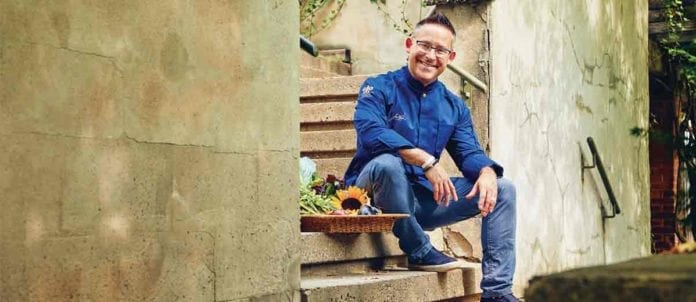If you’re looking for chef Jason Bangerter, you’ll probably find him in his garden, foraging in the woods around Langdon Hall or visiting local farmers. The self-proclaimed locavore has a culinary philosophy deeply entrenched in the terroir of Canada and is renowned for his commitment to home-grown cuisine.
“I’m passionate about food, ingredients and the beauty of the ingredients,” says Bangerter, executive chef at Langdon Hall Hotel & Spa in Cambridge, Ont. “At Langdon Hall, I’ve been very lucky to have such a wonderful space that has a garden, foraging on property and farmers that are just 10 or 15 minutes away with some of the best greens I’ve ever used.”
This passion can be traced back to Bangerter’s childhood and summers spent with his grandparents in Nova Scotia. “My grandparents are amazing cooks. There was always something cooking and, when the tide went out, we’d run out and dig for clams. We’d bring all the beautiful harvest back and cook it in the front yard over a fire,” he recalls. At home in Ontario, “we would end up on a lake, fishing for pickerel and pike, learning to fillet and having these great feasts,” he says. “My dad’s sister is actually a bit of a gourmand and loves to cook. My first experience with classic French cooking, like escargot, was at her condo when I was maybe three years old.”
But being a chef wasn’t on his radar. “I was on a ski trip and cooking for some friends. These guys said to me, ‘you should be a chef.’ And I laughed at them and said ‘why would I be a chef? This is what I do for fun.’ And that’s when it clicked.”
So Bangerter packed his bags, left his job at a Penticton, B.C. ski resort and returned to Toronto where he enrolled in George Brown College’s Culinary Management Program. “I hit the ground running and that’s how it started.”
It’s also how he met his mentor John Higgins, who led the kitchen at The King Edward Hotel. “After doing my research, [I found out] he was the top dog. I remember, it took me a good month to get an audience with this guy. I walked into the kitchen at The King Edward and it was just like that first scene in Ratatouille, with all these pots clanging, people yelling and flames.”
Higgins encouraged Bangerter to pursue his studies and offered him the chance to work on weekends in the staff cafeteria. “From there, it just blew up. I fell in love with being at the hotel and being in the kitchen and I learned my job quickly.”
Soon he started taking on jobs in other departments. “It got to the point where I’d finish a class and, if I had an hour break, I would just run across the street in my whites, join the kitchen and jump in anywhere. I’d work for an hour, then run back to my next class,” he says. “For the first year, I probably worked for free four days out of the week. And, for me, that was a huge bonus to my development. Kids coming out of the colleges were at the beginner level and, by that time, I was way further ahead — it was a great advantage for me.”
Higgins continued to play a role as Bangerter’s career progressed. “He actually took me to help him, on several occasions, with the national culinary team and he gave me the opportunity to go to Europe for a short stint.”
While he’s had a number of mentors along the way, including Anton Mossimann and Michael Bonacini, Bangerter says every person he’s ever worked with has inspired him. “I never think I’m better than anyone else so much that I can’t learn from them. And there are tons of other chefs that, indirectly, were an inspiration.”
During almost a decade as a chef at Auberge de Pommier in Toronto, he constantly studied Daniel Boulud, Alain Ducasse, Olivier Roellinger, Raymond Blanc, as well as Charlie Trotter, Thomas Keller and Patrick O’Connell. “These chefs were a big inspiration,” he explains. “A couple of years ago, I won the International Rising Chef Award from Relais & Chateaux…All the chefs that I had looked up to were the ones that were handing me this award.” Bangerter says he still gets goosebumps just talking about it. “Now, I kind of feel like, okay, you’ve made it — these are colleagues now.”
These experiences drove home the importance of mentorship in an industry Bangerter says can be cutthroat. “You can be humbled and learn something so important from a dishwasher,” he says. “Everyone has the opportunity to influence and inspire anyone in the kitchen. As you grow and develop in this career — and get to the point where you’re in a position like I’m at — there needs to be a big focus on the next generation and the people that work for you.”
His advice to young chefs is “put your head down. Nothing comes quickly in this industry and you’ve got to prove yourself, work hard and listen. Everyone wants to be at the top and, to be at the top, you need drive.”
“[Being a chef] is very confrontational and stressful,” he says. “It’s competitive, but the one thing that I’m teaching my staff, especially my senior staff and my sous chefs, is that their job is not to prove they’re better than everybody else — it’s to get everybody below you to the point where they could, potentially, be better than you.”
Bangerter walks the talk in this regard. His team at Langdon Hall has had a phenomenal year — jumping from 29th place to 15th in the 2017 Canada’s 100 Best publication. In the same year, Bangerter was named Chef of the Year at the OHI Gold Awards and Langdon Hall was chosen to host the North American Relais & Chateaux Congress, welcoming more than 40 owners from Relais & Chateaux properties across North America and France.
“I’m fortunate [Langdon Hall is] hard to get to,” he says. “People who work here are some of the best — they make the decision and sacrifice to work in a place that’s not near a major city and doesn’t have transit. It’s difficult to be a chef out here, but the people we get are dedicated and focused. I have talented people that want to learn and that puts pressure on me to be more on top of things, to be more hands on, to develop things more frequently.”
It also makes it challenging, as a husband and father to two boys — nine and 11 years old — to achieve work/life balance. “My work is my life, but I have a life outside of work, too. I’ve got a wife and two kids and I have to make time to be a super-star at both,” he says.
After nearly 25 years in the industry, Bangerter’s culinary philosophy has come full circle. “First and foremost, it’s an ingredients-first approach. When it comes to cooking, I’m cooking from the land and I feel like I’m getting a little bit weird in terms of using the land and connecting it to tell a story. For example, I have a tuna dish right now and I serve it on a tuna spine instead of using a plate. The same thing with things from the garden — I’ll pull something from the garden and serve it on leaves…it’s [about] connecting the earth and terroir to the food and showcasing that to the guest.”
The chef stands firm in his support of local farmers, as well as ensuring his cooks are going to the garden and not only harvesting their own product, but understanding and respecting it. “It’s important to me to understand that no matter what [the ingredient] is — a fish, a pig or a plant — that we’ve taken that life and it’s our responsibility to do something really special with it and not waste any part of it.”
It’s also about supporting the community, he stresses. “Why would I order tomatoes from California when I’ve got a farmer 10 minutes down the street that is growing better tomatoes and, by buying his tomatoes, the product is fresher. It’s going to taste better and we’re supporting our community. It’s Cambridge first, it’s Ontario second and then it’s Canada — the philosophy is fresh, local and sustainable.”
Langdon Hall has deep roots in its community and Bangerter is a staunch supporter of local charitable initiatives, including RARE Charitable Foundation, Community Living Cambridge, Autism Ontario, Canadian Hospital Foundation, Sick Kids Hospital, the Cambridge Memorial Hospital Foundation and the STOP Community Food Centre, just to name a few.
The next few years show no signs of slowing for Bangerter and his team at Langdon Hall, which recently opened a new wing with an event space that seats 120, eight new guestrooms and a new spa. But, he says, he’s up for the challenge. “I’m proud of where I am now, of the team I’ve built and what we’ve has achieved so far this year,” he adds.


















